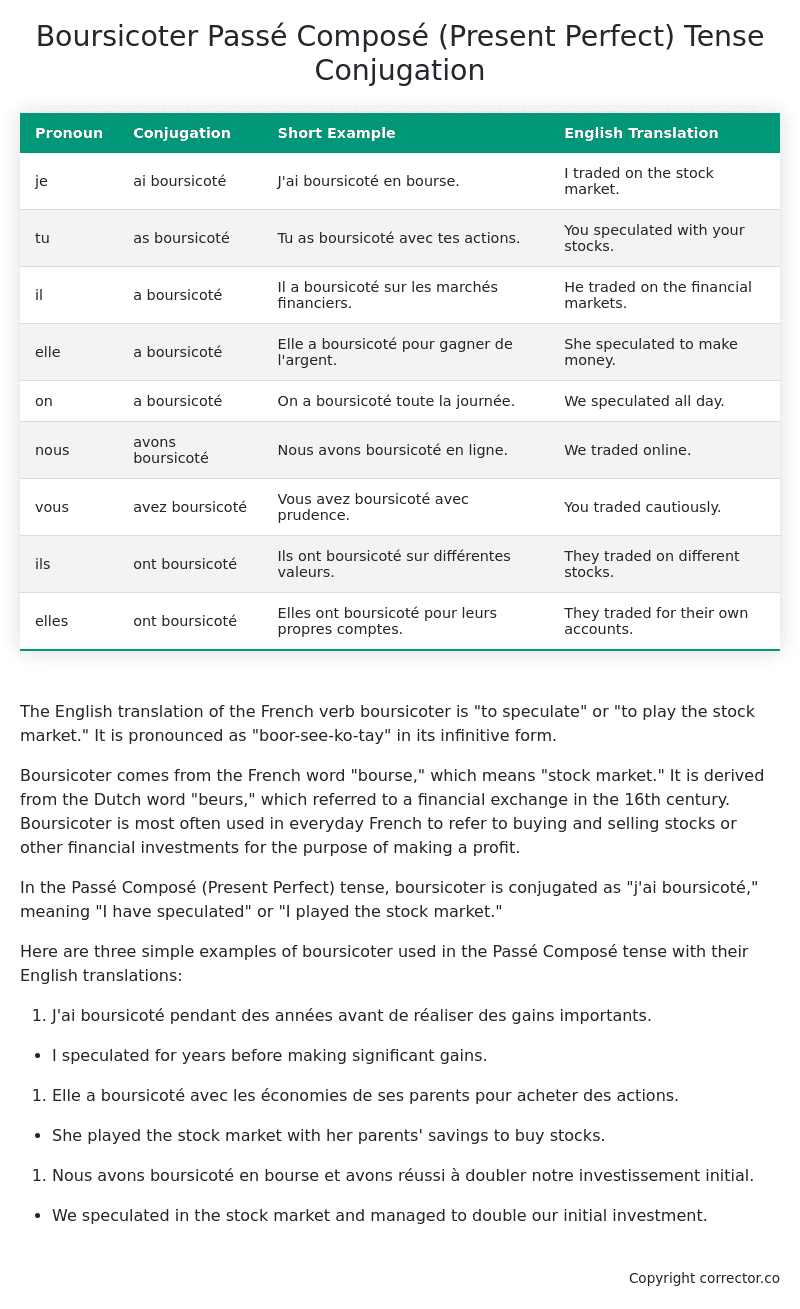Passé Composé (Present Perfect) Tense Conjugation of the French Verb boursicoter
Introduction to the verb boursicoter
The English translation of the French verb boursicoter is “to speculate” or “to play the stock market.” It is pronounced as “boor-see-ko-tay” in its infinitive form.
Boursicoter comes from the French word “bourse,” which means “stock market.” It is derived from the Dutch word “beurs,” which referred to a financial exchange in the 16th century. Boursicoter is most often used in everyday French to refer to buying and selling stocks or other financial investments for the purpose of making a profit.
In the Passé Composé (Present Perfect) tense, boursicoter is conjugated as “j’ai boursicoté,” meaning “I have speculated” or “I played the stock market.”
Here are three simple examples of boursicoter used in the Passé Composé tense with their English translations:
- J’ai boursicoté pendant des années avant de réaliser des gains importants.
- I speculated for years before making significant gains.
- Elle a boursicoté avec les économies de ses parents pour acheter des actions.
- She played the stock market with her parents’ savings to buy stocks.
- Nous avons boursicoté en bourse et avons réussi à doubler notre investissement initial.
- We speculated in the stock market and managed to double our initial investment.
Table of the Passé Composé (Present Perfect) Tense Conjugation of boursicoter
| Pronoun | Conjugation | Short Example | English Translation |
|---|---|---|---|
| je | ai boursicoté | J’ai boursicoté en bourse. | I traded on the stock market. |
| tu | as boursicoté | Tu as boursicoté avec tes actions. | You speculated with your stocks. |
| il | a boursicoté | Il a boursicoté sur les marchés financiers. | He traded on the financial markets. |
| elle | a boursicoté | Elle a boursicoté pour gagner de l’argent. | She speculated to make money. |
| on | a boursicoté | On a boursicoté toute la journée. | We speculated all day. |
| nous | avons boursicoté | Nous avons boursicoté en ligne. | We traded online. |
| vous | avez boursicoté | Vous avez boursicoté avec prudence. | You traded cautiously. |
| ils | ont boursicoté | Ils ont boursicoté sur différentes valeurs. | They traded on different stocks. |
| elles | ont boursicoté | Elles ont boursicoté pour leurs propres comptes. | They traded for their own accounts. |
Other Conjugations for Boursicoter.
Le Present (Present Tense) Conjugation of the French Verb boursicoter
Imparfait (Imperfect) Tense Conjugation of the French Verb boursicoter
Passé Simple (Simple Past) Tense Conjugation of the French Verb boursicoter
Passé Composé (Present Perfect) Tense Conjugation of the French Verb boursicoter (this article)
Futur Simple (Simple Future) Tense Conjugation of the French Verb boursicoter
Futur Proche (Near Future) Tense Conjugation of the French Verb boursicoter
Plus-que-parfait (Pluperfect) Tense Conjugation of the French Verb boursicoter
Passé Antérieur (Past Anterior) Tense Conjugation of the French Verb boursicoter
Futur Antérieur (Future Anterior) Tense Conjugation of the French Verb boursicoter
Subjonctif Présent (Subjunctive Present) Tense Conjugation of the French Verb boursicoter
Subjonctif Passé (Subjunctive Past) Tense Conjugation of the French Verb boursicoter
Subjonctif Imparfait (Subjunctive Imperfect) Tense Conjugation of the French Verb boursicoter
Conditionnel Présent (Conditional Present) Tense Conjugation of the French Verb boursicoter
Conditionnel Passé (Conditional Past) Tense Conjugation of the French Verb boursicoter
L’impératif Présent (Imperative Present) Tense Conjugation of the French Verb boursicoter
L’infinitif Présent (Infinitive Present) Tense Conjugation of the French Verb boursicoter
Struggling with French verbs or the language in general? Why not use our free French Grammar Checker – no registration required!
Get a FREE Download Study Sheet of this Conjugation 🔥
Simply right click the image below, click “save image” and get your free reference for the boursicoter present perfect tense conjugation!

Boursicoter – About the French Passé Composé (Present Perfect) Tense
Formation of the Passé Composé
Set the auxiliary verb with either
Conjugate the auxiliary verb
Add the past participle
Common everyday usage patterns
Narrating Past Events
Sequential Actions
Describing Completed Actions
Interactions with other tenses
Imperfect Tense
Conditional and Future Tenses
Summary
I hope you enjoyed this article on the verb boursicoter. Still in a learning mood? Check out another TOTALLY random French verb conjugation!


